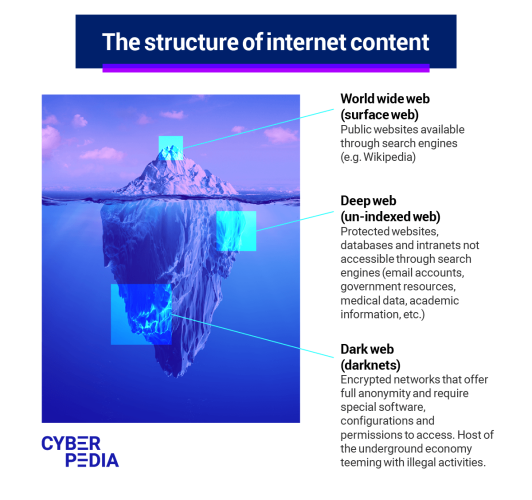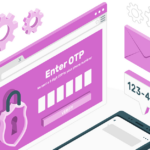Unveiling the Dark Web: A Deep Dive Into Its Cybersecurity Risks
Published: October 17, 2023
The internet, as most of us know it, represents only the tip of the iceberg. Beneath the surface web that we navigate daily lies the deep web, and within this digital abyss, an even more enigmatic real exists – the Dark Web. As October is Cybersecurity Awareness Month, it’s the perfect time to explore what the Dark Web is and dissect its entanglement with cybersecurity.
Understanding the Dark Web
What is the Dark Web?
The Dark Web is a part of the deep web, which is not indexed by conventional search engines like Google. To access it, users need specialized software like Tor (The Onion Router), which conceals their identity and location. While the deep web comprises of unindexed content, the Dark Web is intentionally hidden and typically requires encrypted browsers like Tor to access it.
Layers of the Internet
1. Surface Web (Visible Web)
The Surface Web is the layer of the internet that is indexed by search engines like Google, Bing, and Yahoo. It comprises websites and web pages that are accessible to the general public through standard web browsers.
This is the layer of the internet that most people are familiar with and use daily for activities such as searching, shopping, social media, and accessing information on news sites.
2. Deep Web
The Deep Web refers to the portion of the internet that is not indexed by search engines. It includes web pages and content that are typically hidden behind paywalls, login screens, or forms.
Content in the Deep Web can include confidential databases, subscription-based websites, personal email accounts, and more. It is not inherently secretive or malicious but is merely not accessible via search engines.
3. Dark Web
The Dark Web is a hidden and encrypted part of the Deep Web. Accessible only through specialized software like Tor, it provides anonymity to users and is intentionally concealed from conventional search engines.
The Dark Web is notorious for hosting a wide range of activities, both legal and illegal. It includes privacy advocacy, circumventing censorship, black markets, hacking forums, and more. It is often associated with illicit activities due to its anonymity features.

The Dual Nature of the Dark Web
Legitimate Uses
It’s important to note that the Dark Web isn’t inherently evil. There are legitimate use cases, such as:
1. Privacy Advocacy: Providing a platform for privacy advocates, journalists, and activists in oppressive regimes to communicate safely and securely.
2. Circumventing Censorship: Allowing users to bypass online censorship and access information that might be restricted in certain regions.
3. Legal Marketplaces: Hosting legal businesses that operate within the Dark Web, offering services like secure email providers and cryptocurrency exchanges.
Cybersecurity Risks
On the flip side, the Dark Web is a hub for illicit and malicious activities, creating significant cybersecurity risks:
1. Illegal Marketplaces: Black markets abound, where stolen data, hacking tools, drugs, counterfeit goods, and even hired assassins can be found. This also includes the use of torrent networks to exchange pirated movies, music, etc.
2. Hacking Forums: Cybercriminals exchange ideas, share malware, and offer their services for hire, making it a breeding ground for cyber threats.
3. Phishing and Scams: Users are at a constant risk of encountering phishing attacks or falling victim to scams, potentially resulting in identity theft, financial losses, and other harm.
Conclusion
The Dark Web is a complex, multifaceted space. While it has legitimate uses, its darker side presents substantial risks. Cybersecurity professionals and law enforcement agencies continually monitor the Dark Web for signs of illegal activities.
During Cybersecurity Month, it’s crucial to emphasize that while the Dark Web may be intriguing, it’s not a place for casual exploration. Staying safe online means understanding the risks and the protective measures needed to navigate the digital world securely. Always prioritize your online security and privacy, both on the surface web and beyond.
Reach Out To Us
Recent Posts
-
 Accent Consulting’s Annual Holiday Party 2024December 11, 2024/0 Comments
Accent Consulting’s Annual Holiday Party 2024December 11, 2024/0 Comments -
 AI-Driven Phishing Scams: How Businesses Can Protect Gmail AccountsNovember 14, 2024/
AI-Driven Phishing Scams: How Businesses Can Protect Gmail AccountsNovember 14, 2024/ -

-

-

-
 Celebrating 22 Years of Excellence and GrowthSeptember 5, 2024/
Celebrating 22 Years of Excellence and GrowthSeptember 5, 2024/ -

Schedule a Free Network Assessment
A network assessment is an in-depth analysis of your current IT infrastructure that provides you with a comprehensive understanding of your existing environment and recommends improvements such as network consolidation, simplification, or automation.
Learn More

